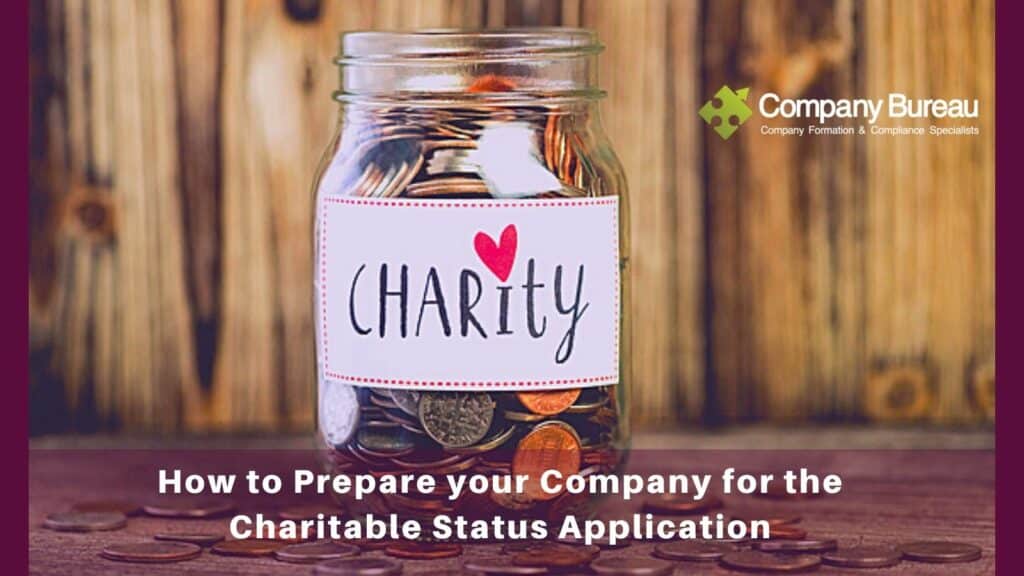Blog
How to Prepare your Company for the Charitable Status Application
By Ashley Coakley, 20th June 2022
The Charities Regulator, which maintains the Register of Charities in Ireland, accepts applications for Charitable Status and ensures registered charities are compliant with the law, primarily the Charities Act 2009 and the Charities Governance Code.
When deciding whether a Charitable Status application is right for your company, the following must be considered:
- Is the company set up for the ultimate purpose of relieving or preventing poverty?
- Is the company for the benefit of the public?
- Is the company for the advancement of religion or education?
If any of the above apply, then this is the option for your company.
According to section 3 (1) of the Charities Act 2009, the following shall be deemed a charitable purpose:
- To relieve poverty
- Advance education
- Advance religion
- Any other purpose beneficial to the community or in the public interest
What is required to apply for Charitable Status?
There are certain requirements that must be met when applying for Charitable Status.
A standard Company Limited by Guarantee (CLG) contains a minimum of two directors, a minimum of two members and an objects clause. If a CLG is set up to apply for Charitable Status, then the following requirements must be met in accordance with the Charities Act 2009:
- Three unrelated directors (referred to as ‘Trustees’ in the case of a charity)
- Three unrelated members
- Objects clause outlining the main company activity, which is required to ‘Make it clear what the organisation is set up to achieve, where the organisation operates, who the organisation helps and how the organisation’s goals will be achieved’. The board of charity trustees should draft the company’s main objects clause.
Steps to prepare for the Charitable Status Application itself
The first step is to register a Company Limited by Guarantee with us, which you can do online. Click here to order a CLG Company. Our company formation experts will draft a constitution that is acceptable by the Charities Regulator, as it is designed in compliance with regulations set out In the Companies Act 2014 and the Charities Act 2009.
We recommend that during the process of the company formation; an account is created with the Charities Regulator to make it easier to register the charity after incorporation.
As soon as the constitution has been approved by the members, the documents are signed and returned to our office, an application is made to the Companies Registration Office and the Company Limited by Guarantee should be incorporated within 2-3 working days. When the company is incorporated it is the company’s duty to apply to the Charities Regulator for Charitable Status.
What does the Charitable Status Application Require?
The Charities Regulator provides a detailed registration guideline to help assist the company with the Charitable Status Application. The applicant must provide key policy documents and upload them to the Charities Regulator website. The constitution, which we provide when the company is incorporated, must be uploaded and clearly state the charitable purpose and objects.
Another requirement of the Charitable Status application is a detailed strategic plan and business plan drafted by the board of trustees. The board of trustees should draft the strategic plan outlining what the charity aims to achieve and how it will achieve this. The business plan should identify the charity outcomes and how the charity raises and proposes to raise funds.
The company must draft a conflict of interest’s policy which will outline how the charity identifies, manages and records any conflicts that may arise. The Charities Regulator recommends that before the client drafts the conflict of interests policy, the company is familiar with the guidance document provided on ‘managing conflicts of interests’. As part of this policy, the Charities Regulator will require details of any connected persons, whether familial or business related.
There are several other requirements which can differ depending on the intended activities of the charity. For example, if the charity intends on working with vulnerable members of the society or children, they must be garda vetted and must have a detailed risk assessment procedure drafted. If the charity is set up to assist a particular selection of people, for example people with a disease or illness, they must provide all details of who the beneficiaries are. If the Charity is to be set up for the sole purposes of enhancing religion, the client must inform the Charities Regulator of the location of the place or worship. The length and requirements of the application will depend on the intended activities of the charity.
What are the benefits of having Charitable Status?
There are many benefits of applying for Charitable Status including:
- Tax-exemption granted by Revenue.
- Applications for on-street collection permits are made easier with Charitable Status.
- Good standing in the eyes of the public when recruiting volunteers.
If you wish to take the first step to register a Company Limited by Guarantee that is ready for the Charitable Status application, please do not hesitate to contact us or call +353 1 6461625.
Disclaimer This article is for guidance purposes only. It does not constitute legal or professional advice. No liability is accepted by Company Bureau for any action taken or not taken in reliance on the information set out in this article. Professional or legal advice should be obtained before taking or refraining from any action as a result of this article. Any and all information is subject to change.


